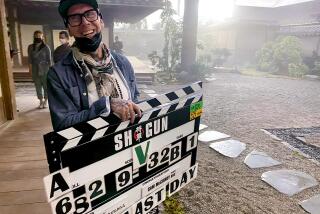Film Did Only So-So in Japan, Director Says
- Share via
Juzo Itami’s “Tampopo” is the funniest, most accessible Japanese comedy within memory, yet surprisingly it was not a big hit in Japan when it opened in November, 1985.
“It only did so-so, and the critics just ignored it,” acknowledged Itami, in town briefly with his wife, Nobuko Miyamoto, who also has the film’s title role. Billed as “the first Japanese noodle Western,” “Tampopo” tells of the struggle of a young widow with that name to make her noodle shop the best in Tokyo with the help of a rugged truck driver--Tsutomu Yamazaki, who dresses like a cowboy--and his pals.
They come to Tampopo’s aid much like Toshiro Mifune and his fellow ronin in “Seven Samurai” came to the rescue of those bandit-beleaguered peasants, but Itami said he was borrowing from Hollywood Westerns rather than from the Kurosawa classic, pointing out that Kurosawa himself has been influenced by Hollywood.
“It’s a simple situation: A stranger comes to town, helps people and drifts away. The critics couldn’t understand why Yamazaki was dressed like a cowboy or why he didn’t take off his hat when he took a bath.”
Itami, who speaks English but relied on an interpreter during a lunch interview, thinks that the lukewarm critical reception accorded “Tampopo” had something to do with the fact that it followed his debut film, “The Funeral,” a smash hit (it will soon be released by “Tampopo’s” American distributor). “The Funeral,” which was shown at the AFI Film Fest, is a dark satire on the hypocrisy of the numerous mourners at an elaborate traditional-style Japanese funeral service. It was so prize-laden that Itami remarked, “I didn’t know there were so many awards!”
“When your first film is very successful, I think there’s a tendency for critics to tear down your second one. But the audience is the final judge, and the fact that ‘Tampopo’ was simply a funny film was not enough to attract present-day Japanese audiences--especially in the winter season. In Japan it was not a must-see film.”
Although there has been a recent spate of iconoclastic satires from Japan, including the current “Comic Magazine,” Itami hesitated to say that they represent a movement. The wide success of “The Funeral” was an exception to the rule, he said. “In America, originality, risk-taking and creativity are looked upon with respect, but they are not considered desirable in Japan.”
Wearing a black Chinese-style high-buttoned blouse and trousers under a black happi coat, Itami spoke with the philosophical tone of the show-business veteran that he is. He is also a film maker who has had a subsequent hit on his hands, a mystery called “The Taxing Woman,” in which Miyamoto plays an income tax investigator. “The title is a play on words,” explained Itami, “because my wife plays a very ugly, aggressive--’taxing’--woman. Prime Minister Nakasone even came to see this one.” “Taxing Woman II” is already completed.
A handsome man who looks at least a decade younger than his 54 years, Itami was born in Kyoto, the son of pioneer director Mansaku Itami, who died when Juzo was only 12. Itami started out to be a commercial artist before turning to acting. He was in Nicholas Ray’s “55 Days at Peking” and Richard Brooks’ “Lord Jim”--and remembers both directors affectionately. Recently, he appeared in “The Makioka Sisters” for the distinguished Kon Ichikawa, who was once his father’s assistant, and he played the father in Yoshimitsu Morita’s zany “The Family Game.” In Japan, he is a well-known essayist. He made his feature directorial debut after years of directing commercials, variety shows and documentaries for television.
As for making the move from acting into directing, Itami said, “In everybody there’s a certain frustration in expressing yourself. Everybody has this whirlwind in him. For a long time, writing and acting had been my way of expressing myself, but I was getting frustrated and decided that in directing I could express myself more fully.” The inspiration for making “The Funeral” came during the elaborate preparations for the funeral of his father-in-law. “The first day was very rainy, the second foggy and the third sunny--that’s when the cremation took place, with the smoke rising against that sunny sky. I said to myself, ‘Wow! That’s a movie!’ ”
With “Tampopo,” which cost $1.5 million to make, the starting point was the desire to make a movie about food. The ideas for the film’s many episodes came first to Itami, then the whole notion of the attempt to make Tampopo the best noodle-maker of them all. Itami admires Alfred Hitchcock, Robert Altman and Walter Hill but especially Luis Bunuel, whose influence on his work can be clearly seen. (To his lasting disappointment, Itami did not realize that Bunuel was living in the Madrid hotel where Itami was staying while filming “55 Days at Peking” and never met him.)
Itami acknowledges that “Tampopo” can be taken as a commentary on the extreme competitiveness of the Japanese. “We’re all brought up to believe in the importance of fulfilling our parents’ expectations,” he said. “You’re constantly trying to live up to them--only a 100% fulfillment will do.” Itami and Miyamoto were pretty zealous themselves in learning everything conceivable about the best way to prepare noodles for their picture.
“I went to 10 different restaurants to see how they prepared their noodles,” said Miyamoto, a classic Japanese beauty dressed in kimono. “Then I would go home and practice. The hardest part was to learn how to wring the noodles like an expert. I practiced until my hand hurt!”
In the ‘60s, before they were married, Itami and Miyamoto, who have two children, both appeared in an early Oshima film, and they’ve worked together in TV commercials. Both say there’s been no problem in their director-actress relationship through four films. “Once on the set I accept that the director has an almighty power,” said Miyamoto, who is 42. “My idea is just to give the best performance I can.”
“I respect my wife as a very, very good actress who has lots of imagination,” said Itami. “Now I feel I can’t work with another actress, but I have to think about whether we should really make a fifth film in a row.
“When we were married, I felt like the teacher and my wife the pupil, because I am so much older than she,” said Itami. “Now I feel like she is the teacher and I am the pupil.”
More to Read
Only good movies
Get the Indie Focus newsletter, Mark Olsen's weekly guide to the world of cinema.
You may occasionally receive promotional content from the Los Angeles Times.










